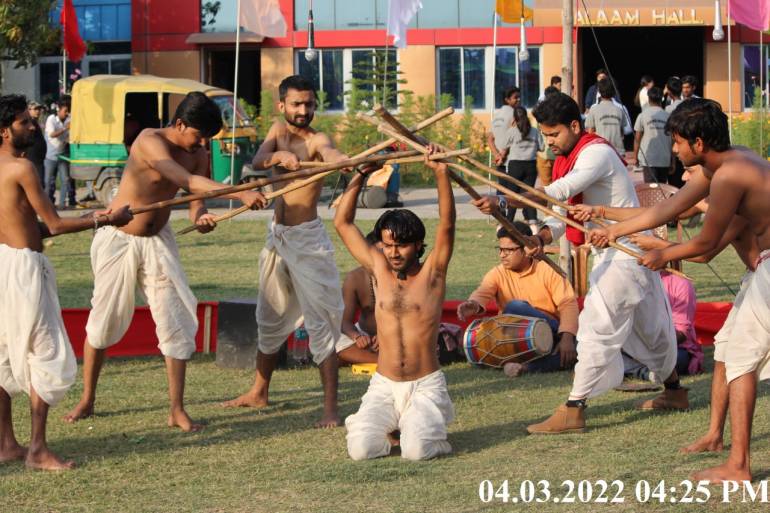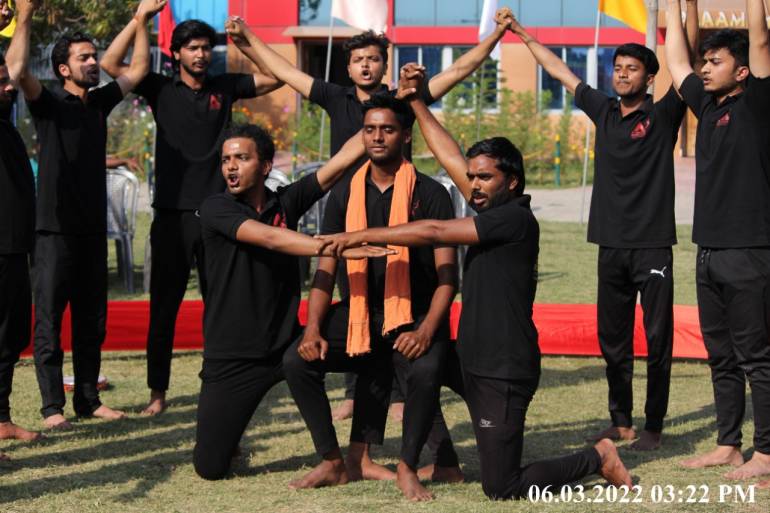Street Play Festival brings messages from grassroots

"Education of the heart is the heart of education," reads a slogan painted on the campus of Jesuit-run college in Patna, the capital of Bihar state in India.
Last weekend, March 4-6, sixteen street theatre troupes brought lessons from real life to educate the hearts of the students and guests at St. Xavier's College of Management and Technology.
The lived experiences of the ordinary, unsung population. The winds and storms that cause upheavals in our lives and that of the nation: hunger, suspicion, greed, hatred, the scourge of coronavirus, the denial of dignity.
Stories of struggle, stories of courage, stories of defeat. Stories so ordinary, yet sublime, woven creatively with wit, song and humour, these were the texts for the students at the second 'Jasn-e-Nukkad,' held annually in memory of Jesuit Father Jacob Srampickal, of one of the state's most significant media educators and proponents of low-cost media.
"Street theatre brings us the messages from the grassroots. We must respect our folk artists and learn from them. The messages of street theatre come from the heart. Media students should learn from the commitment and compassion that these artists have. They are not film stars, but they are the media with the conscience. They dare to perform to the toughest audience on the street. They deserve respect and appreciation," SXCMT Principal Jesuit Father T. Nishaant told students of the Mass Communication Department and Theatre Club, who had organized the festival.

Seasoned theatre troupes, newly trained NGOs, and College theatre groups brought their stories to the arena. A surprise guest performance on child marriage by Dalit Girls School students from an empowerment project run by the social reformer Sudha Verghese stole hearts away. Patna Women's College and Chorus were the two other all-women teams at the event.
Father Jacob Srampickal, who died on 16 April 2012, held a doctorate in Development Communication from the University of Leeds, England, and four major diplomas in communications from India.
In the '90s, the Jesuit priest pioneered bringing media education orientation to schoolteachers across Bihar. He worked closely with various folk troupes and started the first-ever All Bihar Street Theatre Festival for 16 years. He was one of the first to grasp the possibilities presented by the VHS (home videotape system) as a tool not just to record the lived experiences of the downtrodden but as a tool for self-expression and liberation. He started the VHS film festival in 1994 and encouraged several grassroots documentary filmmakers.
He was president of the Indian unit of UNDA/OCIC, the earlier version of Signis, the Church’s international association for social communication, for six years until 1998. He also headed its Asian wing for eight years from 1993. He authored several books on various aspects of communication and media education.

"It is great that St. Xavier's College has instituted the Father Jacob Srampickal Memorial Nukkad Natak Kalasheree Samman an award to honour a person who has made a significant contribution to the development of folk theatre," says trainer and folk artist Birendra Kumar of Bihar Dalit Vikas Samiti who helped organize the event.
The award was given for the first time to Tanveer Akhtar, the national vice president of the Indian Peoples Theatre Association, who has a 30 year involvement with the folk arts.
"The Jesuits have always provided space for subaltern voices. Ravi Bharati, the regional audiovisual centre, supported the margins’ voices for almost two decades. Now that the centre is closed, it is so appropriate that another Jesuit institution, St. Xavier's College at XTTI, has thrown open its grounds and welcomed us. They need to be heard on more campuses to keep genuine voices alive. And the truth is often difficult and uncomfortable. Young people should face the truth, even if it is at times unglamorous and uncomfortable," Akhtar told RVA news.
Radio Veritas Asia (RVA), a media platform of the Catholic Church, aims to share Christ. RVA started in 1969 as a continental Catholic radio station to serve Asian countries in their respective local language, thus earning the tag “the Voice of Asian Christianity.” Responding to the emerging context, RVA embraced media platforms to connect with the global Asian audience via its 21 language websites and various social media platforms.














